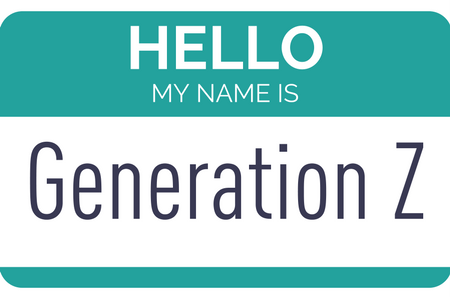I have some news: Today's youth are not Millennials. Young people from ages 7-22 today are members of an entirely different generation. While they're post-Millennial, they definitely are not just a hyper version of Millennials (more on that in a later post).
Beyond the fact that some people aren't aware of this new generation, there are a variety of names going around for the generation born between 1995-2010. The Founders, iGen, digital natives, the Homeland Generation, Centennials. As I've worked more in researching this generation, I have grown to prefer using the name Generation Z over their many other nicknames.
To my knowledge there is not a guild of generational researchers who get together to decide the names of generations. If there is such a guild, please call me because I would like to join.
Generation Z was the first name I heard used, but that is not the sole reasoning for my opinion. Sure, the name Generation Z might not be creative as this group follows Generation X (born 1965-1980) and Generation Y (born 1980-1995. Generation Y ended up shedding their "letter name" and are now more commonly known as Millennials). Some would even argue that Millennials shaking Generation Y is exactly why we shouldn't call Generation Z by this name.
My biggest reason for advocating for the name Generation Z has nothing to do with creativity or clever play on words. I use the name Generation Z because it does not solely focus on a singular aspect of the societal context in which they grew up.
Take the name the Homeland Generation for instance. This refers to the impacts of 9/11 and the threats to homeland security that have and will continue to have on this generation. 9/11 had monumental impacts on Americans of all ages (even those not born at the time) and people around the world. Almost any American alive at the time can likely tell you exactly where they were and what they were doing when it happened. 9/11 is a pivotal event that has made an impact on this generation, but it is not the only event to do so. A name like the Homeland Generation suggests that threats to homeland security are the most prominent influence on this generation.
Names like digital natives or iGen evoke similar thoughts. These names put a predominant focus on one aspect of this generation: their use of technology. iGen narrows in on their use of smartphones, specifically iPhones. It alludes that the advent of the iPhone is the most pivotal aspect of this generation. It also suggests that all members of Generation Z can afford an iPhone, which is typically a pricey piece of technology. Not to deny that this group of young people heavily uses smartphones, but to reduce their cohort name to echo a single piece of technology would be like calling the Baby Boomers the "TV Generation" or Generation X the "Desktop Generation." If we focus their name on the technology they use, we'll begin to fixate our understanding of them similarly. I say this to every group that I speak with: There is so much more to Generation Z than the technology they use. If anything, we should be more impressed with how they use technology. To Generation Z, their smartphones and technology are not distractions, but seen as tools that help them navigate a growingly complex world that is lived both in-person and online.
9/11 and technological advances have played major contributing roles in shaping the world Generation Z grew up in. However, we cannot put a singular aspect of this context above another to gain a full and robust understanding of Generation Z. There is much more braided into the societal fabric that has shaped and influenced Generation Z. Comprehensively recognizing the context of Generation Z will help us better understand their characteristics, motivations, behaviors, and aspirations. There is much to be learned about this incredibly intelligent, driven, compassionate group of people. Stay tuned...

